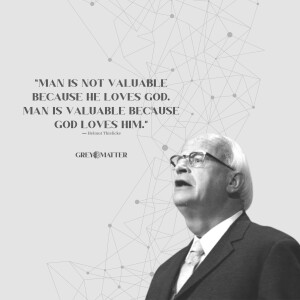
Monday Jan 30, 2023
The Illusion Of Control: And The Pointless Pain We Suffer To Sustain It
An excerpt from the original article:
Helmut Thielicke was a 20th Century Lutheran theologian who stood between two worlds: academia and the church.
Thielicke was born in 1908 in Barmen, Germany, a boiling pot of cultural and religious upheaval. It was there that Thielicke’s cultural teeth were cut. Following his early schooling, he attended the renowned Gymnasium in Wuppertal, known for its successful graduates and astute teachers. Thielicke was drawn to theology because he perceived it to be the most learned and complex of all disciplines.
He entered the University of Greifswald in 1928 before going to Erlangen to study with Paul Althaus. He later enrolled in the University of Bonn, where the great Professor Karl Barth taught. He concluded his education at the University of Marburg, where he wrote two dissertations for which he received doctorates in both philosophy (1931) and theology (1934).
Like his contemporary, Dietrich Bonhoeffer, Thielicke struggled under the Hitlerian regime during the period of conflict between the Confessing Church and the Nazi Party, which essentially put Der Fuhrer at the head of both church and state. Thielicke’s public critiques of Nazism caused his expulsion from a coveted teaching post at Heidelberg in 1940, where he had taught since 1936. Bishop Wurm aided Thielicke by ordaining him in 1941, and he served quietly as lecturer and pastor at Stuttgart for the remainder of the War.
As a theological professor, Thielicke exhibited the remarkable ability to communicate effectively with both the German academy and laity alike. He was not a theological reformer who sought to change the face of Christianity or the structure of society. He was not at all concerned with politics, except to the extent that they interfered with the work of the church. He was however keenly concerned with updating the language of theology so that it addressed and inspired people from all walks of life.
Thielicke quickly resumed his post-war professional career in August of 1945. He joined the faculty in Tubingen, where he remained until 1954, before resigning to join the newly formed theological faculty at the University of Hamburg. In his writings of that period, he took on the complex dilemmas and perplexing problems which Germans faced in their families, churches, institutions and government.
He strove to set forth theological and ethical premises for living within the new German milieu. Thielicke’s most popular sermonic work is called “The Waiting Father” (1959). This treatise is a book of sermons on the parables of Jesus, including a prescient exposition on the parable of the Seed Growing Secretly, in which he both reflects upon the scientific arrogance of the early Cold War era and presages the current 21st century globalist agenda: (at page 84)
“Now, what will this human voice say?"
To read the full article visit: https://www.greymatterpodcast.ca/the-illusion-of-control/
No comments yet. Be the first to say something!